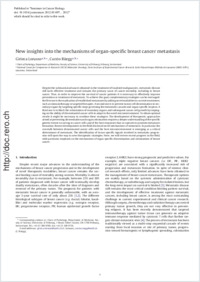New insights into the mechanisms of organ-specific breast cancer metastasis
- Lorusso, Girieca Chair of Pathology, Department of Medicine, Faculty of Science, University of Fribourg, Switzerland - Molecular Oncology, Swiss Institute of Experimental Cancer Research, Ecole Polytechnique Fédérale de Lausanne, Switzerland
- Rüegg, Curzio Chair of Pathology, Department of Medicine, Faculty of Science, University of Fribourg, Switzerland - Molecular Oncology, Swiss Institute of Experimental Cancer Research, Ecole Polytechnique Fédérale de Lausanne, Switzerland
-
05.04.2012
Published in:
- Seminars in Cancer Biology. - 2012, vol. 22, no. 3, p. 226-233
English
Despite the substantial advances obtained in the treatment of localized malignancies, metastatic disease still lacks effective treatment and remains the primary cause of cancer mortality, including in breast cancer. Thus, in order to improve the survival of cancer patients it is necessary to effectively improve prevention or treatment of metastasis. To achieve this goal, complementary strategies can be envisaged: the first one is the eradication of established metastases by adding novel modalities to current treatments, such as immunotherapy or targeted therapies. A second one is to prevent tumor cell dissemination to secondary organs by targeting specific steps governing the metastatic cascade and organ-specific tropism. A third one is to block the colonization of secondary organs and subsequent cancer cell growth by impinging on the ability of disseminated cancer cells to adapt to the novel microenvironment. To obtain optimal results it might be necessary to combine these strategies. The development of therapeutic approaches aimed at preventing dissemination and organ colonization requires a deeper understanding of the specific genetic events occurring in cancer cells and of the host responses that co-operate to promote metastasis formation. Recent developments in the field disclosed novel mechanisms of metastasis. In particular the crosstalk between disseminated cancer cells and the host microenvironment is emerging as a critical determinant of metastasis. The identification of tissue-specific signals involved in metastatic progression will open the way to new therapeutic strategies. Here, we will review recent progress in the field, with particular emphasis on the mechanisms of organ specific dissemination and colonization of breast cancer.
- Faculty
- Faculté des sciences et de médecine
- Department
- Médecine 3ème année
- Language
-
- English
- Classification
- Biological sciences
- License
- License undefined
- Identifiers
-
- RERO DOC 29137
- DOI 10.1016/j.semcancer.2012.03.007
- Persistent URL
- https://folia.unifr.ch/unifr/documents/302465
Statistics
Document views: 73
File downloads:
- rue_nim.pdf: 430
